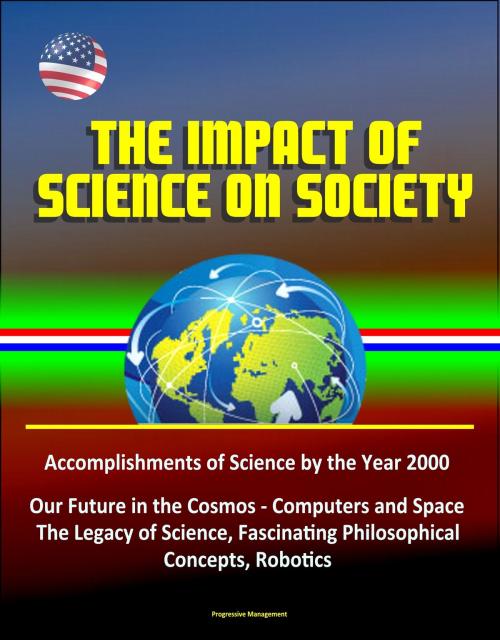The Impact of Science on Society: Accomplishments of Science by the Year 2000, Our Future in the Cosmos - Computers and Space, The Legacy of Science, Fascinating Philosophical Concepts, Robotics
Nonfiction, Science & Nature, Science, Physics, Astronomy, Other Sciences, History| Author: | Progressive Management | ISBN: | 9781310109812 |
| Publisher: | Progressive Management | Publication: | March 13, 2016 |
| Imprint: | Smashwords Edition | Language: | English |
| Author: | Progressive Management |
| ISBN: | 9781310109812 |
| Publisher: | Progressive Management |
| Publication: | March 13, 2016 |
| Imprint: | Smashwords Edition |
| Language: | English |
Professionally converted for accurate flowing-text e-book format reproduction, this historic legacy by NASA contains essays from three prominent figures, British historian James Burke, ABC TV science editor and reporter Jules Bergman, and scientist and science fiction writer Dr. Isaac Asimov, to celebrate the 25th anniversary of the National Aeronautics and Space Administration (NASA) in 1983.
These authorities covered the impact of science on society from the time of man's first significant scientific invention to that of expected future scientific advances. The papers are edited transcripts of these speeches. Since the talks were generally given extemporaneously, the papers are necessarily informal and may, therefore, differ in style from the authors' more formal works. As the included audience questions illustrate, the topic raises far-reaching issues and concerns serious aspects of our lives and future.
Science and technology have had a major impact on society, and their impact is growing. By drastically changing our means of communication, the way we work, our housing, clothes, and food, our methods of transportation, and, indeed, even the length and quality of life itself, science has generated changes in the moral values and basic philosophies of mankind. Beginning with the plow, science has changed how we live and what we believe. By making life easier, science has given man the chance to pursue societal concerns such as ethics, aesthetics, education, and justice; to create cultures; and to improve human conditions. But it has also placed us in the unique position of being able to destroy ourselves.
Contents * Foreword * The Legacy of Science * James Burke * Accomplishments of Science by the Year 2000 * Jules Bergman * Our Future in the Cosmos - Computers * Isaac Asimov * Our Future in the Cosmos - Space * Isaac Asimov * The Legacy of Science
Professionally converted for accurate flowing-text e-book format reproduction, this historic legacy by NASA contains essays from three prominent figures, British historian James Burke, ABC TV science editor and reporter Jules Bergman, and scientist and science fiction writer Dr. Isaac Asimov, to celebrate the 25th anniversary of the National Aeronautics and Space Administration (NASA) in 1983.
These authorities covered the impact of science on society from the time of man's first significant scientific invention to that of expected future scientific advances. The papers are edited transcripts of these speeches. Since the talks were generally given extemporaneously, the papers are necessarily informal and may, therefore, differ in style from the authors' more formal works. As the included audience questions illustrate, the topic raises far-reaching issues and concerns serious aspects of our lives and future.
Science and technology have had a major impact on society, and their impact is growing. By drastically changing our means of communication, the way we work, our housing, clothes, and food, our methods of transportation, and, indeed, even the length and quality of life itself, science has generated changes in the moral values and basic philosophies of mankind. Beginning with the plow, science has changed how we live and what we believe. By making life easier, science has given man the chance to pursue societal concerns such as ethics, aesthetics, education, and justice; to create cultures; and to improve human conditions. But it has also placed us in the unique position of being able to destroy ourselves.
Contents * Foreword * The Legacy of Science * James Burke * Accomplishments of Science by the Year 2000 * Jules Bergman * Our Future in the Cosmos - Computers * Isaac Asimov * Our Future in the Cosmos - Space * Isaac Asimov * The Legacy of Science















